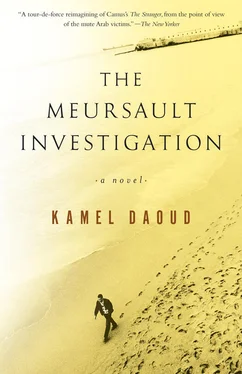Kamel Daoud - The Meursault Investigation
Здесь есть возможность читать онлайн «Kamel Daoud - The Meursault Investigation» весь текст электронной книги совершенно бесплатно (целиком полную версию без сокращений). В некоторых случаях можно слушать аудио, скачать через торрент в формате fb2 и присутствует краткое содержание. Год выпуска: 2015, Издательство: Other Press, Жанр: Современная проза, на английском языке. Описание произведения, (предисловие) а так же отзывы посетителей доступны на портале библиотеки ЛибКат.
- Название:The Meursault Investigation
- Автор:
- Издательство:Other Press
- Жанр:
- Год:2015
- ISBN:нет данных
- Рейтинг книги:5 / 5. Голосов: 1
-
Избранное:Добавить в избранное
- Отзывы:
-
Ваша оценка:
- 100
- 1
- 2
- 3
- 4
- 5
The Meursault Investigation: краткое содержание, описание и аннотация
Предлагаем к чтению аннотацию, описание, краткое содержание или предисловие (зависит от того, что написал сам автор книги «The Meursault Investigation»). Если вы не нашли необходимую информацию о книге — напишите в комментариях, мы постараемся отыскать её.
In a bar in Oran, night after night, he ruminates on his solitude, on his broken heart, on his anger with men desperate for a god, and on his disarray when faced with a country that has so disappointed him. A stranger among his own people, he wants to be granted, finally, the right to die.
The Stranger
The Meursault Investigation
The Meursault Investigation — читать онлайн бесплатно полную книгу (весь текст) целиком
Ниже представлен текст книги, разбитый по страницам. Система сохранения места последней прочитанной страницы, позволяет с удобством читать онлайн бесплатно книгу «The Meursault Investigation», без необходимости каждый раз заново искать на чём Вы остановились. Поставьте закладку, и сможете в любой момент перейти на страницу, на которой закончили чтение.
Интервал:
Закладка:
III
These days, my mother’s so old she looks like her own mother, or maybe her great-grandmother, or even her great-great-grandmother. Once we reach a certain age, time gives us the features of all our ancestors, combined in the soft jumble of reincarnations. And maybe, in the end, that’s what the next world is, an endless corridor where all your ancestors are lined up, one after another. They turn toward the living descendant and simply wait, without words, without movements, their patient eyes fixed on a date. Mama’s already living in a kind of institution, that is, in her dark little house, her little body huddled up in there like a last piece of hand luggage. The diminishment that comes with old age often strikes me as incredible, compared with the long history of a whole life. Anyway, an assembly of ancestors, condensed into a single face, seated in a circle, and facing me, as though to judge me or to ask me if I’ve finally found a wife. I don’t know my mother’s age, just as she has no idea how old I am. Before Independence, people did without exact dates; the rhythms of life were marked by births, epidemics, food shortages, et cetera. My grandmother died of typhus, an episode that served by itself to establish a calendar. My father left on a December first, I believe, and since then, that date’s been a reference point for measuring the temperature of the heart, so to speak, or the beginning of the big cold.
You want the truth? I rarely go to see my mother nowadays. She lives in a house under a sky where a dead man and a lemon tree are loitering. She spends her days sweeping every corner of that house. She’s rubbing out traces. Of whom, of what? Well, the traces of our secret, which was sealed one summer night, and which caused me to make the definitive leap into manhood … Be patient, I’ll tell you about it. So Mama lives in a kind of village, Hadjout, formerly known as Marengo, seventy kilometers from the capital. That was where I spent the second half of my childhood and part of my youth, before going to Algiers to learn a profession (government land administration) and then returning to Hadjout to practice it. It was routine work that offered powerful nourishment to my meditations. We — my mother and I — had put as much distance as possible between us and the sound of breaking waves.
Let’s take up the chronology again. We left Algiers — on that famous day when I was sure I’d spotted Zubida — and went to stay with an uncle and his family, who barely tolerated us. We lived in a hovel before being kicked out by the very people who’d taken us in. Then we lived in a little shed on the threshing floor of a colonial farm where we both had jobs, Mama as a maid of all work and me as a chore boy. The boss was this obese guy from Alsace who ended up smothered in his own fat, I believe. People said he used to torture slackers by sitting on their chests. They also said he had a protruding Adam’s apple because the body of an Arab he’d swallowed was lodged in his throat. I still have memories from that period: an old priest who would sometimes bring us food, the jute sack my mother made into a kind of smock for me, the semolina dishes we’d eat on big days. I don’t want to tell you about our troubles, because back then they were only a matter of hunger, not injustice. In the evening, we kids would play marbles, and if one of us didn’t show up the following day, that would mean he was dead — and we’d keep on playing. It was the period of epidemics and famines. Rural life was hard, it revealed what the cities kept hidden, namely that the country was starving to death. I was afraid, especially at night, of hearing the bleak sound of men’s footsteps, men who knew that Mama had no protector. Those were nights of waking and watchfulness, which I spent glued to her side. I was well and truly the uld el-assas , the night watchman’s son and heir.
Strangely enough, we gravitated around Hadjout and its vicinity for years before we were able to settle in behind solid walls. Who knows how much cunning and patience it cost Mama to find us a house, the one she still lives in today? I sure don’t. In any case, she figured out what the right move was, and I must acknowledge that she had good taste. I’ll invite you to her funeral! She got herself hired as a housekeeper and waited, with me perched on her back, for Independence. The truth of the matter is that the house belonged to a family of settlers who left in a hurry, and we ended up occupying it during the first days of Independence. It’s a three-room house with wallpapered walls, and in the courtyard, a dwarf lemon tree stares at the sky. There are two little sheds on the side of the house, and the entrance has a wooden doorway. I remember the vine that provided shade all along the walls and the strident peeping of the birds. Before we moved into the main house, Mama and I resided in an adjacent shack, which a neighbor uses as a grocery store today. You know, I don’t like to remember that period. It’s as if I was pushed into begging for pity. When I was fifteen, I worked as a farm laborer. One day I got up before dawn; work was rare, and the nearest farm was three kilometers from the village. Do you know how I got a job? I’m going to confess: I let the air out of another worker’s bicycle tires so I could show up earlier than he did and take his place. Yes indeed, that’s hunger for you! I don’t want to play the victim, but it took us years to cross the dozen or so meters that separated our hovel from the settlers’ house, years of tiny, fettered steps, like slogging through mud and quicksand in a nightmare. I believe more than ten years passed before we finally got our hands on that house and declared it liberated: our property! Yes, yes, we acted like everybody else during the first days of freedom, we broke down the door, took the tableware and the candlesticks. What happened? It’s a long story. I’m getting a bit lost.
The rooms in that house have always been very dark. It’s like there’s a wake going on all the time, the lighting’s so bad. Every three months, I show up there to doze a little and look at my mother for an hour or two. After that, nothing happens. I drink some black coffee and get back on the road, go to a bar, and start waiting again. In Hadjout, everything looks pretty much the same as it did at the time when your hero accompanied his alleged mother’s coffin to her grave. Nothing seems to have changed, if you don’t count the new cinder-block buildings, the storefronts, and the extreme idleness that looks like it’s the rule everywhere. Who, me? Nostalgic for French Algeria? No! You haven’t understood a word I’ve said. I was just trying to tell you that back then, we Arabs gave the impression that we were waiting, not going around in circles like today. I know Hadjout and its surroundings by heart, right down to the stones in the roads. The village has grown bigger and less orderly. The cypresses have disappeared, and so have the hills, under the proliferation of unfinished houses. There are no more roads through the fields. As a matter of fact, there are no more fields.
I think it’s the place where a living person can get closest to the sun without leaving the earth. According to my childhood memories, at least. But these days I don’t like it anymore, that place, and I dread the day when I’ll be obliged to go back there to bury Mama — who doesn’t seem to want to die. At her age, passing away doesn’t make sense anymore. One day, I asked myself a question that you and your people have never asked yourselves, even though it’s the first clue to the puzzle. Your hero’s mother — where’s her grave? Yes, over in Hadjout, but where, exactly? Who’s ever visited it? Who’s ever located the old people’s home where she lived in the book? Who’s run his finger over the inscription on her gravestone? Nobody I know of. I myself have looked for that grave, but I’ve never found it. There were a bunch of people in the village with similar names, but the exact name of the murderer’s mother is still unknown. Yes, of course, there’s a possible explanation: Some of our people even decolonized the colonists’ cemeteries, and you’d often see street kids playing ball with disinterred skulls, I know. That’s practically become a tradition here when colonists run away. They often leave us three things: words, roads, and bones … Except that I’ve never found your hero’s mother’s grave. Did he lie about his origins? I believe so. That would explain his legendary indifference and his impossible chilliness in a country flooded with sunlight and covered with fig trees. Maybe his mother wasn’t what people think she was. I know I’m just blathering here, but my suspicion is well founded. Your hero talks about that funeral in such detail, he seems to want to produce a fable, not a report. It’s like a handmade reconstruction, not a private confidence. A too-perfect alibi, not a memory. Do you realize what it would mean if I could prove what I’m telling you, if I could prove your hero wasn’t even present at his mother’s funeral? Years later, I questioned some people from Hadjout, and guess what? Nobody remembers that name, nobody remembers a woman who died in an old folks’ home or a procession of Christians in the sun. The only mother who proves this story’s not an alibi is mine, and she’s still at home, sweeping the courtyard around our lemon tree.
Читать дальшеИнтервал:
Закладка:
Похожие книги на «The Meursault Investigation»
Представляем Вашему вниманию похожие книги на «The Meursault Investigation» списком для выбора. Мы отобрали схожую по названию и смыслу литературу в надежде предоставить читателям больше вариантов отыскать новые, интересные, ещё непрочитанные произведения.
Обсуждение, отзывы о книге «The Meursault Investigation» и просто собственные мнения читателей. Оставьте ваши комментарии, напишите, что Вы думаете о произведении, его смысле или главных героях. Укажите что конкретно понравилось, а что нет, и почему Вы так считаете.












